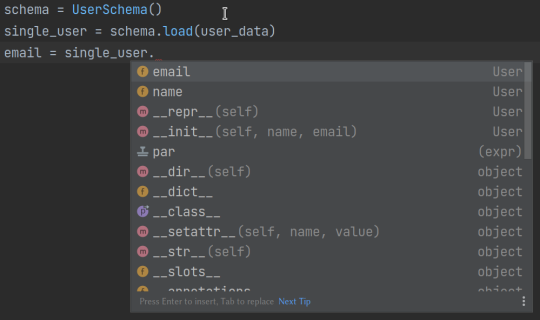generated from daniil-berg/boilerplate-py
82 lines
3.1 KiB
Markdown
82 lines
3.1 KiB
Markdown
# marshmallow-generic
|
|
|
|
**Generic schema with full typing support and minimal boilerplate**
|
|
|
|
---
|
|
|
|
**Documentation**: <a href="http://daniil-berg.github.io/marshmallow-generic" target="_blank"> daniil-berg.github.io/marshmallow-generic </a>
|
|
|
|
**Source Code**: <a href="https://github.com/daniil-berg/marshmallow-generic" target="_blank"> github.com/daniil-berg/marshmallow-generic </a>
|
|
|
|
---
|
|
|
|
Extension for <a href="https://github.com/marshmallow-code/marshmallow" target="_blank">**`marshmallow`**</a> to make <a href="https://marshmallow.readthedocs.io/en/stable/quickstart.html#deserializing-to-objects" target="_blank">deserialization to objects</a> easier and improve type safety.
|
|
|
|
The main `GenericSchema` class extends <a href="https://marshmallow.readthedocs.io/en/stable/marshmallow.schema.html#marshmallow.schema.Schema" target="_blank">`marshmallow.Schema`</a> making it **generic** in terms of the class that data should be deserialized to, when calling <a href="https://marshmallow.readthedocs.io/en/stable/marshmallow.schema.html#marshmallow.schema.Schema.load" target="_blank">`load`/`loads`</a>.
|
|
|
|
With `GenericSchema` there is no need to explicitly write `post_load` hooks to initialize the object anymore. 🎉
|
|
|
|
If the "model" class is (for example) `User`, it just needs to be passed as the type argument, when subclassing `GenericSchema`. The output of the `load`/`loads` method will then be automatically inferred as either `User` or `list[User]` (depending on whether `many` is `True` or not) by any competent type checker. ✨
|
|
|
|
## Usage Example
|
|
|
|
```python
|
|
from marshmallow_generic import GenericSchema, fields
|
|
|
|
|
|
class User:
|
|
def __init__(self, name: str, email: str) -> None:
|
|
self.name = name
|
|
self.email = email
|
|
|
|
def __repr__(self) -> str:
|
|
return "<User(name={self.name!r})>".format(self=self)
|
|
|
|
...
|
|
|
|
class UserSchema(GenericSchema[User]):
|
|
name = fields.Str()
|
|
email = fields.Email()
|
|
|
|
|
|
user_data = {"name": "Monty", "email": "monty@python.org"}
|
|
schema = UserSchema()
|
|
single_user = schema.load(user_data)
|
|
print(single_user) # <User(name='Monty')>
|
|
|
|
json_data = '''[
|
|
{"name": "Monty", "email": "monty@python.org"},
|
|
{"name": "Ronnie", "email": "ronnie@stones.com"}
|
|
]'''
|
|
multiple_users = schema.loads(json_data, many=True)
|
|
print(multiple_users) # [<User(name='Monty')>, <User(name='Ronnie')>]
|
|
```
|
|
|
|
Adding `reveal_type(single_user)` and `reveal_type(multiple_users)` at the bottom and running that code through <a href="https://mypy.readthedocs.io/en/stable/" target="_blank">`mypy`</a> would yield the following output:
|
|
|
|
```
|
|
# note: Revealed type is "User"
|
|
# note: Revealed type is "builtins.list[User]"
|
|
```
|
|
|
|
With the regular `marshmallow.Schema`, the output of `mypy` would instead be this:
|
|
|
|
```
|
|
# note: Revealed type is "Any"
|
|
# note: Revealed type is "Any"
|
|
```
|
|
|
|
This also means your IDE will be able to infer the types and thus provide useful auto-suggestions for the loaded objects. 👨💻
|
|
|
|
Here is PyCharm with the example from above:
|
|
|
|

|
|
|
|
## Installation
|
|
|
|
`pip install marshmallow-generic`
|
|
|
|
## Dependencies
|
|
|
|
Python Version `3.9+` and `marshmallow` (duh)
|